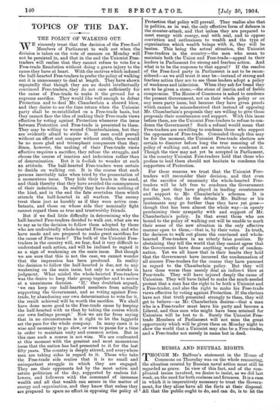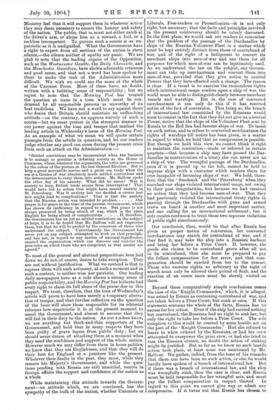T HOUGH Mr. Balfour's statement in the House of Commons on
Thursday was on the whole reassuring, the situation created by Russian naval action must still be regarded as grave. In view of this fact, and of the com- plicated issues involved, we desire to insist, as we did last week, on the need for both coolness and firmness. It is a case in which it is imperatively necessary to trust the Govern- ment, for they alone have all the facts at their disposal. All that the public ought to do, and can do, is to let the Ministry feel that it will support them in whatever action they may deem necessary to ensure the honour and safety of the nation. The public, that is, must not either catch at the driver's arm, or abuse him as a coward, a fool, or a reckless incompetent. To pursue such a course is as un- patriotic as it is undignified. What the Government have a right to expect from all sections of the nation is stern silence,—the silence neither of apathy nor panic. We are glad to note that the leading organs of the Opposition, such as the Westminster Gazette,.the Daily Chronicle, and the Manchester Guardian, have shown admirable reticence and good sense, and that not a word has been spoken by them to make the task of the Administration more difficult. We wish we could say the same of the whole of the Unionist Press. Most of them have, no doubt, written with a befitting sense of responsibility ; but we regret to note that the Morning Post has treated the question at issue in a tone which must be con- demned by all responsible persons as unworthy of its best traditions. We have not a word to say against those who desire that Britain should maintain an unflinching attitude—on the contrary, we approve warmly of such a course—but we must protest in the strongest manner in our power against the tone and temper that marked the leading article in Wednesday's issue of the Morning Post. As an example of what we mean we will quote certain passages from the article in question, and let our readers judge whether any good can come during the present crisis from such an attack on the Administration :— " Settled convictions may be inconvenient when the business is to manage so peculiar a debating society as the House of Commons, where, whatever the arguments, the votes are governed by the colour of the posters at the last General Election. But to keep a great mercantile marine and a great sea trade when the sea is a theatre of war absolutely needs settled convictions and the determination to carry them into action. Mr. Balfour spoke the other day of his anxiety. What did he mean ? Was it anxiety to keep British trade secure from interruption? That would have led to action that might have caused anxiety in St. Petersburg. Was it anxiety lest too decided a course just now might lead to complications ? That is just the anxiety that the Russian action was intended to produce Our prayer is for peace in the time of the present Government, which has shown its inefficiency in regard to war. But peace is not always preserved by being afraid of war, which is the plain
English for being afraid of complications If, therefore, the Government has as yet no settled convictions on the subject at large, it is to be hoped that Mr. Balfour will not improvise them, but that he will be guided by the consensus of those who understand the subject. • Unfortunately the Government has never yet on any subject attempted to work on that principle, and has not, in regard to any matter of national significance, created the organisation which can discover and register the principles on which those who are competent in that matter are agreed."
To most of the general and abstract propositions here laid down we do not, of course, desire to take exception. They are not without justification. What we contend is that to express them with such acrimony, at such a moment and in such a context, is neither wise nor patriotic. Our leading daily newspapers have as a rule shown a strong sense of public responsibility, and the Morning Post has hitherto had every right to claim its full share of the praise due in this respect. We trust, therefore, that the tone of Wednesday's article will prove to have been merely a temporary aberra- tion of temper, and that further reflection on the question of the hour will show those responsible for its editorial columns how unpatriotic it is at the present moment to assail the Government, and almost to assume that they will fail in their duty to the nation. As our traders know, we are anything but thick-and-thin supporters of the Government, and hold that in many respects they have been guilty of grave lapses from public duty ; but we should never dream of attacking them at a moment when they need the confidence and support of the whole nation. However much we may differ from them in home politics, we know that they are Englishmen, and that they will do their best for England at a juncture like the present. Whatever their faults in the past, they must, while they remain his Majesty's Government, and while the ques- tions pending with Russia are still unsettled, receive in foreign affairs the support and confidence of the nation as a whole While maintaining this attitude towards the Govern- ment—an attitude which, we are convinced, has the sympathy of the bulk of the nation, whether Unionists or Liberals, Free-traders or Protectionists—it is not only right, but necessary, that the facts and principles involved in the present controversy should be calmly discussed. In the first place, we would ask our readers to remember that the problem of the passage of the Dardanelles by ships of the Russian Volunteer Fleet is a matter which must be kept entirely distinct from those of contraband of war, and of the right of a belligerent to convert its merchant ships into men-of-war and use them for all purposes for which men-of-war can be legitimately used. As we understand the law on the subject, any Govern- ment can take up merchantmen and convert them into men-of-war, provided that they give notice to neutral Powers that they have effected such a change. The reason is clear. If a vessel is to exercise the tremendous rights which international usage confers upon a ship of war, the world must be able to distinguish clearly between merchant vessels and warships. But in the case of converted merchantmen it can only do this if it has received notice of the fact of conversion. This being so, the breach of international law committed by the Russians would seem to consist in the fact that they did not give us, aneutral Power, notice that the ships of the Volunteer Fleet sent by Russia to the Red Sea had become ships of war. To insist on such notice, and to refuse to converted merchantmen the rights of warships till notice has been given, is a matter in regard to which we hold that no compromise is possible. But though we hold this view, we cannot think it right to maintain the contention—made or inferred in certain quarters—that because a ship may have passed the Dar- danelles in contravention of a treaty she can never act as a ship of war. The wrongful passage of the Dardanelles, even if it is proved up to the hilt, cannot be held to impress ships with a character which renders them for ever incapable of becoming ships of war. We hold, there- fore, that the Smolensk' and the 'Petersburg' when they searched our ships violated international usage, not owing to their past irregularities, but because we °had received no notice that they had become men-of-war. That they had previously violated the international treaty rights in passing through the Dardanelles with guns and armed crews on board is another and most important matter, and one calling for an international settlement; but it only creates confusion to treat these two separate violations of public right simultaneously.
Our conclusion, then, would be that after Russia has given us proper notice of conversion, her converted merchantmen may search for contraband of war, and if they find it, may take the ship into a Russian harbour and bring her before a Prize Court. If, however, the goods she claims to be contraband prove after all not to be contraband, then she must be prepared to pay the fullest compensation for her error, and that com- pensation should be exacted from her to the utmost. Those who exercise rights so arbitrary as the right of search must only be allowed their pound of flesh, and the exaction of an ounce more must be sternly visited on them.
Beyond these comparatively simple conclusions comes the case of the ' Knight Commander,' which, it is alleged, was seized by Russia as containing contraband of war, and not taken before a Prize Court, but sunk at once. If this statement contains the whole of the facts, Russia has no excuse for her action. Even if the ship had carried nothing but contraband, the Russians had no right to sink her, but only the right to take her before a Prize Court. The sole exception to this would be created by some hostile act on the part of the Knight Commander.' Had she refused to heave to when ordered by the Russians, or had her crew attempted to overpower the prize crew, or had she tried to ram the Russian cruiser, no doubt the action of sinking might be justified. But as far as we know no such hostile action took place, at least none was mentioned by Mr. Balfour. We gather, indeed, from the tone of his remarks that there can have been no such action, or else he would hardly have spoken of a breach of international law. But if there was a breach of international law, and the ship was wrongfully sunk, then the case is clear, and Russia must be held responsible for her wrongful acts, and must pay the fullest compensation in respect thereof. In regard to this point we cannot give way or admit any compromise. If it turns out that Russia has chosen to On the whole question we can only say again that patience, firmness, and calmness must be our watchwords till the problem is settled. The public must give the Government its fullest confidence and support, and it must expect from them that the Russian case will be examined without prejudice, and also without fear or favour. If the Russian action can be justified by international usage, then no ill-feeling caused by the offensive way in which Russia has acted must be allowed to precipitate a quarrel. If, on the other hand, Russia cannot justify her action, the fullest compensation must be demanded and exacted from her for every action ascertained to be contrary to the just rights of neutrals.








































 Previous page
Previous page